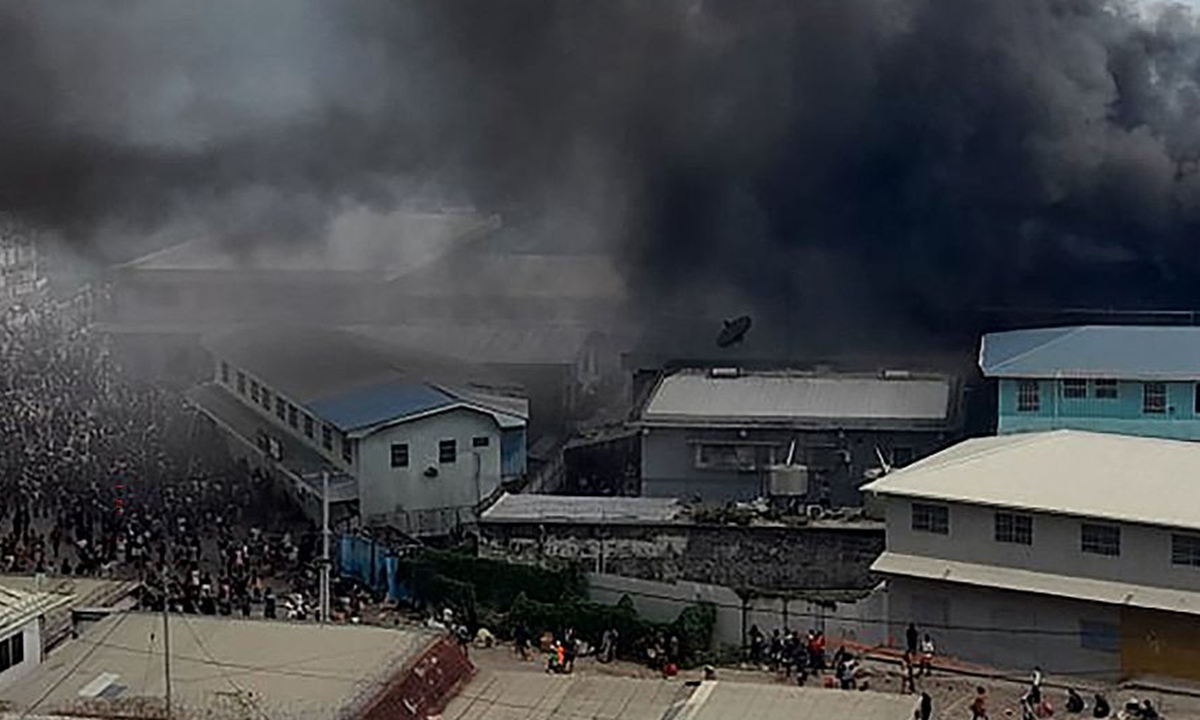
This handout image taken and received on November 25, 2021 from ZFM Radio shows parts of the Chinatown district on fire in Honiara on Solomon Islands, as rioters torched buildings in the capital in a second day of anti-government protests. Photo: VCG
The capital city of the Solomon Islands has been under riots for days. The rioters have stormed the parliament, set fire to a police station, and attacked Chinatown and other businesses there.
Solomon Islands Prime Minister Manasseh Sogavare on Friday blamed foreign interference for instigating the anti-government protests over his government's decision to cut "diplomatic ties" with the island of Taiwan and establish diplomatic ties with the Chinese mainland. Though, he didn't specify who is among the "other powers" that fomented the violence.
Sogavare emphasized that the choice to establish diplomatic ties with Beijing conforms to the trend of the times and international laws.
The Solomon Islands is a country with nearly 690,000 people in the South Pacific region. After Sogavare assumed office in 2019, his administration made a choice to set up diplomatic ties with Beijing. However, the island of Malaita of the country, where most of the rioters are reportedly from, has maintained its relations with the island of Taiwan.
The New York Times said the Solomon Islands has been in a "heightened political tug of war," citing a former Australian diplomat stationed in the Solomon Islands saying that the US has been providing Malaita with direct foreign aid. Such analysis is representative of the US and Australia.
Defending against China's influence into the South Pacific has been an outstanding geopolitical consideration of the US and Australia, which has been welcomed and longed by the Taiwan authorities, because four of the remaining 15 countries that keep "diplomatic ties" with Taiwan are in the South Pacific - and the future to consolidate such ties is uncertain.
The South Pacific countries and the Chinese mainland have a strong capacity to cooperate under the framework of the Belt and Road Initiative. Over the years, many small nations have, on their own, chosen to have closer ties with Beijing. The measures taken to prevent these small countries from establishing diplomatic ties with China have included "dollar diplomacy," coercion, and inciting unrest within these countries to topple local governments.
Australia has been offered a hand to maintain security in the Solomon Islands. Recently, Canberra has again deployed more than 100 police and defense force personnel to the country. Against this backdrop, it is not hard to imagine how easy it will be for an external force to wreak havoc there.
Australia, the US, or the Taiwan authorities haven't admitted to being behind the "foreign interference" condemned by Sogavare. Australian Prime Minister Scott Morrison insisted that Australia's "presence there does not indicate any position on the internal issues of the Solomon Islands." Canberra even alleged the move was in response to a request from Sogavare.
Nonetheless, the Associated Press cited observers as saying that "Australia intervened quickly to avoid Chinese security forces moving in to restore order." More importantly, neither Canberra nor Washington has condemned the riots in the Solomon Islands so far, despite the fact that the unrest has violated the basic spirit of democracy and the rule of law. Media coverage of the riots in the US and Australia was "matter-of-fact" and highlighted the rioters' political opposition to diplomatic relations with China.
It is clear that Australia's overall attitude, and that of the US, is to connive with and even encourage the unrest, even though the Australian troops and police were sent to keep order in the Solomon Islands. What is right and what is not is obvious. Hence, aren't Morrison's remarks of "not indicate any position" actually a support for the evil doings?
The government of the Solomon Islands and their people know what is really going on there. It is also not hard for the outside world to know. Prime Minister Sogavare noted there were other powers fomenting the riots, shouldn't the international community believe the words of this legitimate leader of the Solomon Islands?




